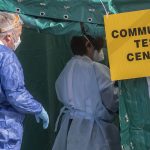The UK has reported another 35,707 COVID cases and 29 more coronavirus-related deaths in the latest 24-hour period.
It is the highest number of infections since 22 January when 40,261 cases were recorded.
Friday’s figures compare to 32,551 infections and 35 deaths reported on Thursday.
96,430 people had their first dose of a coronavirus vaccine in the UK on Thursday, taking the total to 45,697,875.
And 175,467 people had their second jab, meaning 34,374,246 are now fully vaccinated.
Meanwhile, England’s R number rose slightly to between 1.2 and 1.5 and infections rates increased sharply across the UK.
The R number – which represents the average number of people each person who has COVID goes on to infect – was between 1.1 and 1.3 last week.
The current estimate means that, on average, every 10 people infected will go on to infect between 12 and 15 others.
It comes as the latest data from the Office for National Statistics shows around one in 160 people in England had coronavirus in the week to 3 July – the highest number since the week to 19 February.
Scotland now has the highest infection rate in the UK with around one in 100 people in private households having COVID-19 in the same period.
That’s up from one in 150 the previous week and the highest since 16 January.
In Wales, the infection rate is one in 340 people – the highest since the week to 27 February.
Live COVID-19 updates from the UK and around the world
And in Northern Ireland, that figure sat it one in 300, which is the highest since 3 April.
Earlier this week, Prime Minister Boris Johnson announced almost all coronavirus rules, including legal requirements to wear face masks and limits on the number of people who can meet together, are set to be lifted on 19 July.
More than 100 scientists have condemned the government’s plan – describing it as a “dangerous and unethical experiment” in a letter published in The Lancet this week.
They warned the exponential growth of COVID-19 “will likely continue until millions more are infected, leaving hundreds of thousands with long-term illness and disability” and the strategy risks “the emergence of vaccine-resistant variants”.






















